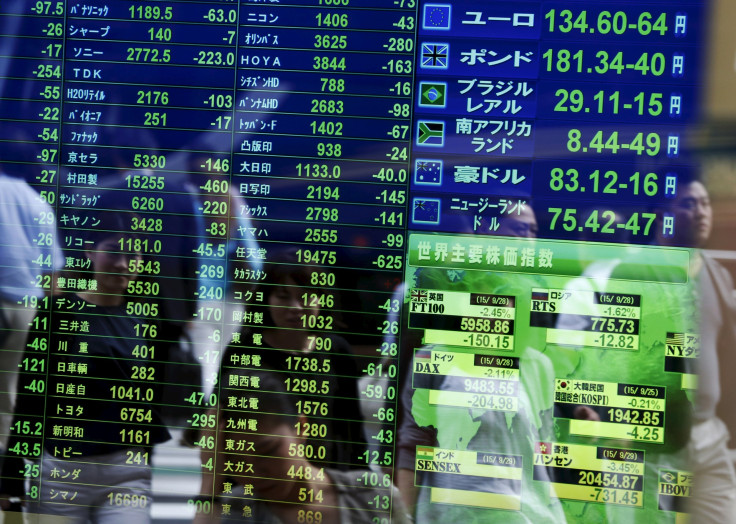Asia Shares Slip As US Earnings Disappoint, Dollar Gains

Asian shares hit three-week lows on Wednesday after a dour start to Wall Street's corporate earnings season knocked U.S. stocks, while the dollar and Treasury yields were at multi-month highs on growing expectations of a U.S. interest rate hike in December.
The British pound jumped back from lows in a volatile trading session, though concerns about a "hard Brexit" are likely to keep the currency under pressure.
MSCI's broadest index of Asia-Pacific shares outside Japan <.MIAPJ0000PUS> fell 0.4 percent while Japan's Nikkei futures <JNMcm1> slipped 0.6 percent.
On Wall Street, the U.S. S&P 500 Index <.SPX> fell 1.2 percent to near one-month low, and dipped below its 100-day moving average - seen as a major support - for the first time since June.
Shares of aluminum producer Alcoa <AA.N> tumbled 11.4 percent and diagnostics test maker Illumina <ILMN.O> plummeted 24.8 percent following their disappointing earnings, casting a pall over the market.
Also undermining risk sentiment were rises in global bond yields.
"Rising bond yields will be a major market theme in coming three months or so. For one, there's speculation that central banks in both Europe and Japan could start tapering," said Yoshinori Shigemi, global market strategist at JPMorgan Asset Management.
"Inflation expectations are rising because of oil and U.S. wage growth. We don't expect oil prices to hit $80 or $90, but even if they stay around $50, that's about 10 percent above their levels last year, thus putting inflationary pressure."
Investors are growingly convinced that the U.S. Federal Reserve will raise interest rates in December while avoiding a hike at its next meeting less than a week before the U.S. presidential election.
The 10-year U.S. Treasuries yield <US10YT=RR> rose to 1.781 percent, its highest level since early June.
U.S. interest rate futures <0#FF:> are pricing in about 75 percent chance of a rate hike by December, little changed over the past couple of days.
"The markets had relied on expectations of monetary stimulus for a long time but that is changing with bond yields rising around the world. You have rising interest rates and falling EPS. That's obviously bad for stocks," said Norihiro Fujito, senior investment strategist at Mitsubishi UFJ Morgan Stanley Securities.
The specter of rising U.S. interest rates helped to lift the dollar's index against a basket of six major currencies <.DXY> <=USD> to its highest in seven months.
The index stood at 97.476, after having risen to as high as 97.758 on Tuesday, climbing above its July peak of 97.569.
The euro <EUR=> hit a two-month low of $1.1049 and last stood at $1.1054.
The Chinese yuan continued to soften as the dollar firmed, slipping to a fresh six-year low of 6.7230 in onshore trade <CNY=CFXS> while the offshore yuan <CNH=> traded near its lowest since January.
The yen <JPY=> was little changed at 103.42 to the dollar.
The British pound jumped 1.5 percent in thin Asian trade to $1.2307, after having fallen nearly 5 percent in the previous four sessions.
Some market players suspected sterling benefited from a report by Bloomberg that British Prime Minister Theresa May has accepted that Parliament should be allowed to vote on her plan for taking Britain out of the European Union.
"The pound is being bought back after its big falls. But given that Brexit will remain a major theme for the markets, its likely to be capped," said Shinichiro Kadota, chief currency strategist at Barclays Securities Japan.
Oil prices inched up to stay near one-year highs hit earlier this week, with investors waiting for talks between OPEC producers and other oil exporters on curbing output to end a glut in the global market.
Brent crude futures <LCOc1> traded at $52.59 per barrel, up 0.3 percent in Asia, edging closer to Monday's high of $53.73.
© Copyright Thomson Reuters 2024. All rights reserved.




















